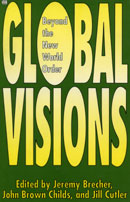
Global Visions
Beyond the News World Order
Brecher, Jeremy; Childs, John Brown; Cutler, Jill
Publisher: Black Rose, Montreal, Canada
Year Published: 1993
Pages: 320pp Price: $19.99 ISBN: 1-895431-74-3
Library of Congress Number: HF1359.G55 1993 Dewey: 327.17
Resource Type: Book
Cx Number: CX6306
This book seeks to establish how our diverse globalizing world can be turned into a common home. The authors create a dialogue about the two types of globalization occurring in the world: globalization from above and globalization from below.
Abstract:
This book seeks to establish how our diverse globalizing world can be turned into a common home. The authors create a dialogue about the two types of globalization occurring in the world.
The first type is "a one world community", also known as globalization-from-below, which is made up of social forces that seek to fight oppression, humiliation and collective violence.
Globalization-from-above takes resources from local communities and from nature to increase the wealth of the powerful. Despite the fiction that opposition to it has been defeated, this globalization excludes and suppresses using police, paramilitary, and military means. Consequences include: religious and nationalist fundamentalism; the erosion of the nation state's power to control its own society; increased polarity between the North and the South under the label of free-market economic liberalism; threatening communities and natural environments and a larger gap between the rich and poor.
Globalization-from-above or "the new world order" is more widely recognized and composed of the leading states, transnational businesses and political elite actors in the international realm. In contrast, globalization-from-below tries to restore communities with the power to nurture environments, increase ordinary people's access to resources, democratize political institutions at all levels, redistribute power amongst a decentralized multilevel system and impose pacification on conflicting power holders. The more recent internationalist collectives under this alternative movement are pluralistic in nature, rather than the original social initiatives that were nationalist in nature. These pluralistic initiatives, supported by technological initiatives, transcend geographic borders.
The hope is that this dialogue will establish globalization-from-below as a new paradigm to reshape the world order. Thus, the book is structured into three parts as follows: New World Order vs. One-World Community: The Forum, Globalization-from-Above: Critiques and Globalization-from-Below: Alternatives. This collection of essays by 32 contributors from more than 20 countries originated from a symposium published in Z magazine in response to an article by Jeremy Brecher. Part I is a debate on the global alternative proposals mentioned in the lead essay by Brecher entitled " 'The Heirarchs' 'New World Order'-And Ours." Part II looks at the attempts to continue domination via internationalization. Finally, Part III looks at the problems and possibilities of a one world community.
[Abstract by Amanpreet Dhami]
Table of Contents
Part I: New World Order vs. One-World Community: The Forum
1. The Hierarchs' New World Order - and Ours
2. Capitalist Rivalry and People's Participation
3. The Value of Diversity for Global Cooperation
4. Building an Alternative World Order: What is to be Done?
5. Peaceful, People-Centered, and Ecologically Sensitive Development
6. The Making of Global Citizenship
Part II: Globalization from Above: Critiques
7. The Greening of the Global Reach
8. Economic Globalization: A New Geography, Composition, and Institutional Framework
9. Latin America in the New World Order
10. Glasnost: The New World Order and Post-colonialism in Africa
11. Africa and the New World Dis-Order
12. New World Order: Old Arab World Problems
13. Malama 'Aina: Take Care of the Land
14. A Very Bad Way to Enter the Next Century
Part III: Globalization from Below: Alternatives
15. For an Alliance of Hope
16. Reforming North Economy, South Development, and World Economic Order
17. The Transformations Must be Deep and Global
18. Facing the New International Context of Development
19. One Man No Chop
20. Labour Standards and Double Standards in the New World Order
21. Opposing the New World Order in Canada
22. Ethnicity and New Constitutive Orders
23. Cross-Boundary Sub-States
24. An Alternative World Order and the Meaning of Democracy
25. The Lessons of 1989
26. Internationalism is Dead! Long Live Global Solidarity?
27. Sustainable Dialogue / Sustainable Development
28. Moving Peoples and Nations
29. Patriotism and Global Citizenship
30. The Great Tree of Peace
31. Co-Creating a One-World Community
32. The Uprooted from the Land
Notes on Contributors
Index
Subject Headings


